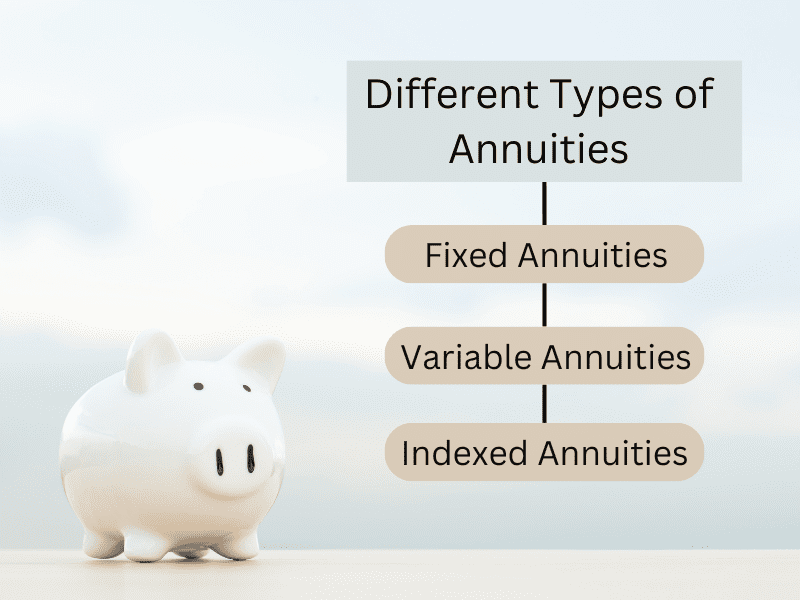Annuities are a type of investment that can provide a steady stream of income during retirement. In simple terms, an annuity is a contract between an individual and an insurance company, where the individual makes regular payments or a lump sum payment in exchange for future payments.
To understand how annuities work, it’s important to first grasp the concept of compounding interest. When you invest in an annuity, your money grows over time through compound interest. This means that not only does your initial investment earn interest, but the interest also earns interest, resulting in exponential growth.

There are different types of annuities investments available, including fixed annuities, variable annuities, and indexed annuities. Fixed annuities offer a guaranteed rate of return for a specific period of time. Variable annuities allow you to invest in various funds and have the potential for higher returns but also come with more risk. Indexed annuities combine elements of both fixed and variable annuities.
The way annuity payments are structured can vary as well. Some individuals may choose to receive regular income payments for a specific period or for their lifetime. Others may opt for deferred payments that accumulate over time until they decide to start receiving income.
Overall, annuities can be a valuable tool for retirement planning by providing a reliable source of income in addition to other retirement savings and investments. However, it’s important to carefully consider your financial goals and consult with a financial advisor before deciding if an annuity is right for you.
Table of Contents
Securing Long-Term Financial Stability: The Benefits of Investing in Annuities
Investing in annuities can offer several benefits for long-term financial security, especially when it comes to retirement planning. One of the key advantages is the guaranteed income stream that annuities provide. Unlike other investment options, annuities offer a reliable and steady source of income that can last for a specific period or even for life.
Another benefit of annuities is the tax advantages they offer. When you invest in an annuity, your earnings grow on a tax-deferred basis. This means that you won’t have to pay taxes on your investment gains until you start receiving distributions. This can be particularly advantageous during retirement when your tax bracket may be lower.
Annuities also provide flexibility in terms of payout options. You can choose to receive regular payments over a fixed period or opt for lifetime income, ensuring that you have a steady stream of funds throughout your retirement years.
Furthermore, annuities often come with additional features such as death benefits, which allow you to pass on any remaining funds to your beneficiaries upon your passing.
Overall, investing in annuities can provide peace of mind and financial stability by offering guaranteed income, tax advantages, and flexible payout options. It’s important to consult with a financial advisor who specializes in retirement planning to determine if an annuity aligns with your long-term financial goals and needs.
Navigating Annuities Investments Options: Understanding Types, Features, and Benefits
When it comes to annuity investments, there are several different types to consider. Each type has its own features and benefits, making it important to understand the differences before making a decision.
One common type of annuity is the fixed annuity. With a fixed annuity, you receive a guaranteed rate of return on your investment for a specified period of time. This can provide stability and peace of mind for investors who prefer a predictable income stream.
On the other hand, variable annuities offer more flexibility and potential for growth. With a variable annuity, your investment is tied to underlying investment options such as stocks or bonds. This means that your returns can fluctuate based on market performance.
Indexed annuities combine features of both fixed and variable annuities. They offer a guaranteed minimum return along with the potential for additional earnings based on the performance of an underlying index, such as the S&P 500.

Immediate annuities provide an immediate income stream in exchange for a lump sum payment. This can be beneficial for individuals who want to start receiving regular payments right away, such as retirees.
Lastly, deferred annuities allow you to accumulate funds over time before starting to receive payments at a later date. This can be advantageous for individuals who are looking to save for retirement or have long-term financial goals.
Understanding the different types of annuity investments can help you make informed decisions about your financial future. It’s important to carefully consider your individual needs and goals before choosing which type of annuity is right for you.
Determining your risk tolerance and investment goals is crucial when considering annuities as part of your investment strategy. Annuities offer a range of options for investors, but it’s important to align these choices with your individual risk tolerance and financial objectives.
To begin, conducting a risk tolerance assessment is essential. This assessment helps you understand how comfortable you are with potential fluctuations in the value of your investments. It takes into account factors such as your financial situation, investment experience, and emotional ability to handle market volatility.
Once you have determined your risk tolerance level, you can then establish your investment goals with annuities. These goals may vary depending on whether you prefer a conservative or aggressive investing strategy.
Conservative investors typically prioritize capital preservation and steady income streams. They may opt for fixed annuities that offer guaranteed returns and a predictable income stream over time. These annuities provide stability and lower risks compared to other investment options.
On the other hand, aggressive investors are willing to take more risks in pursuit of potentially higher returns. They may choose variable annuities that allow them to invest in different asset classes such as stocks or bonds within their annuity contract. This flexibility offers the potential for greater growth but also comes with increased market exposure.
By understanding your risk tolerance and aligning it with your desired investment goals, you can make informed decisions when selecting annuities that suit your needs. It’s always advisable to consult with a financial advisor who can help assess your risk profile and guide you towards appropriate annuity options based on your unique circumstances.
When it comes to annuity investments, there are certain strategies that can help maximize your returns. Diversification within your annuities portfolio is one such strategy. By spreading your investments across different types of annuities, you can reduce risk and potentially increase your overall returns.
Timing your withdrawals from an annuity is another important aspect to consider. Withdrawing funds at the right time can have a significant impact on the amount you receive. It’s crucial to understand the terms and conditions of your specific annuity contract and plan your withdrawals accordingly.
Additionally, it’s important to regularly review and reassess your annuity investment strategies. Market conditions and personal financial goals may change over time, so staying informed and adjusting your approach accordingly can help optimize returns.
By implementing these tips, you can make informed decisions about your annuity investments and work towards maximizing the returns on your investment portfolio.
The Crucial Role of Annuities in Retirement and Estate Planning Strategies
Annuities play a crucial role in both retirement planning and estate planning strategies. They provide a reliable source of income during retirement and can also be utilized to transfer wealth to beneficiaries as part of an estate plan.
When it comes to retirement income planning, annuities offer several benefits. They provide a guaranteed stream of income for life or a specific period, ensuring retirees have a stable source of funds even when other investments may fluctuate. Annuities can be tailored to meet individual needs, offering options such as fixed or variable rates, inflation protection, and survivorship benefits for spouses.
In terms of estate planning, annuities can be utilized as part of a comprehensive strategy. By designating beneficiaries on the annuity contract, individuals can ensure that their loved ones receive the remaining value of the annuity upon their passing. This allows for the smooth transfer of assets outside of probate and may offer certain tax advantages.
Additionally, annuities can be used strategically in estate planning to minimize estate taxes. By structuring annuities with appropriate ownership and beneficiary designations, individuals may effectively reduce their taxable estate while still providing financial security for their beneficiaries.

It is important to note that while annuities offer unique advantages in retirement and estate planning, they are not suitable for everyone. It is advisable to consult with a financial advisor or planner who specializes in these areas to determine if incorporating annuities into your overall financial strategy aligns with your specific goals and circumstances.
Making informed decisions about annuity investments is crucial for ensuring a secure financial future. Annuities can play a significant role in retirement planning and providing financial stability.
By understanding the different types of annuities available and their associated features, individuals can make informed choices that align with their specific financial goals and risk tolerance. It is important to consider factors such as the annuity’s payout structure, fees, surrender period, and potential tax implications.
Additionally, seeking professional advice from a certified financial planner or advisor can provide valuable insights and guidance when considering annuity investments. These experts can assess an individual’s unique circumstances and help determine if an annuity is suitable for their long-term financial plans.
Ultimately, by taking the time to research and understand annuities thoroughly before making investment decisions, individuals can increase their chances of achieving a secure financial future. Annuities have the potential to provide steady income streams during retirement years while offering protection against market volatility. With careful consideration and expert guidance, individuals can navigate the complexities of annuity investments and pave the way for a financially stable future.
Also Read: Exploring Alternative Investments: A Comprehensive Guide to Diversifying Your Portfolio

